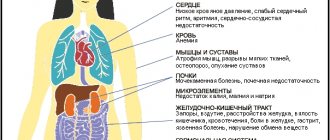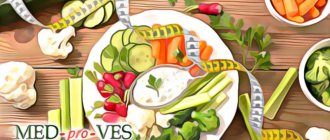During pregnancy, a woman is simply obliged to gain weight and under no circumstances lose weight. The organism growing inside it inevitably leads to weight gain - this is normal. But the increase should be exactly as much as is necessary for the development of the unborn child. At a certain point, this parameter even begins to be monitored by doctors. At the same time, obstetricians are not at all concerned about the aesthetic side of the issue - excessive obesity during pregnancy is fraught with serious complications. That's why it's so important to try to keep your weight within certain limits.
Normal weight
You should not think that weight gain during pregnancy is required solely for the normal development of the baby; this is an important factor for normal pregnancy in general. To keep weight gain within normal limits, it is important to constantly monitor them.
Is it possible to lose weight during pregnancy? Yes, but you need to do it correctly:
- Buy scales and write a page in your notebook where all the results will be written down.
- Measure weight only on the same scales and on the same day of the week.
- Weigh yourself only in the morning (before eating, but after going to the toilet).
- When weighed, it does not become visible in shoes and clothes.
If we consider that on average a woman will gain 10-12 kg during pregnancy, then they will be distributed approximately as follows: for the fetus - 3300 g, placental membranes - 450 g, uterus - 850 g, water - 900 g, an increase in the amount of blood that circulates , volume for mammary gland enlargement, fat gain - 2100 g, fluid in tissues - 2600 g.
The added weight depends not only on the food consumed, but also on the physiological characteristics of the body. Calculating normal weight gain for your body is not difficult - you just need to know your BMI. This can be done using a special online calculator on the Internet. If you are underweight, an increase of up to 17 kg during pregnancy is allowed, and if you are underweight, up to 14 kg. If you are overweight, it is better not to gain more than 11 kg, if you are obese - up to 7 kg.
The size of the fetus and the age of the woman will also affect the gain. If a healthy woman has a weight gain of less than 5 kg, then it is worth thinking about disorders in the body.
Diet principles
To lose weight while pregnant without harming the baby, a woman must follow the principles of proper nutrition to maintain a normal weight:
- The range of products must be varied and of high quality.
- Take care of a rich vitamin and mineral complex not only in the form of seasonal homemade fruits and vegetables, but also vitamin complexes (for example, Elevit, Vitrum Prenatal).
- Maintain normal bowel function.
- Be sure to include fish, dairy products, cereals, and vegetable oils in your diet. Make sure to drink enough liquid. It can be not only water, but also juices, fresh juices, herbal teas.
- Eating at a certain time will also prevent you from gaining extra pounds.
- You will have to forget about fatty foods, animal products, pickles, flour products, store-bought cakes and carbonated drinks.
Why comply
Excessive weight gain can be dangerous for a pregnant woman and the fetus itself. We can talk about a pathological gain if, starting from the 16th week, a woman gains 1000 g or more weekly.
An increased layer of fat not only prevents a normal assessment of the condition of the fetus, but can lead to:
- Diseases of the heart and blood vessels.
- Disorders of the nervous system and endocrine system.
- High blood pressure and problems with blood clotting.
- The load on the spine and the risk of urinary tract infections increases.
For the fetus, the risk of premature birth or miscarriage and early rupture of amniotic fluid increases. This may be a direct indication for a caesarean section or the cause of pathological weight gain in the child. In addition, in the womb the fetus increases the risk of oxygen starvation, lack of nutrients, imbalances between parts of the child’s body, a tendency to become overweight after birth, and the risk of neurological diseases increases.
Cooking methods
To lose weight during pregnancy, you need to monitor not only the quantity of foods, but also how they are prepared. To ensure that dishes remain healthy with the maximum amount of vitamins and minerals, it is advisable to use baking (use foil or a sleeve for this) and steaming as a cooking method. You can simply stew or boil the food.
If you want to eat less food and improve digestion and metabolic processes in the body, drink a glass of water 20-30 minutes before meals.
Physical exercise
In addition to overeating, the cause of excess weight is also a sedentary lifestyle. But during pregnancy, you need to monitor the intensity of your training, since too much physical activity has a negative impact on the condition of the fetus. During this period, a woman should not engage in sports such as running, weightlifting, contact and game sports.
Swimming is beneficial for pregnant women, as water reduces the load on the joints and spine and makes movements smoother and easier. This sport has a calming effect on the nervous system and relaxes all muscles. When visiting the pool, you need to take care of safety:
- use a tampon to protect the vagina from infection;
- To avoid slipping, wear slippers with grooved soles.
Another option for physical activity is visiting fitness centers, where you can select special programs for pregnant women. During this period, you are allowed to do yoga, gymnastics, Pilates or bodyflex. The exercises in these training programs are aimed at stretching, making the muscles more pliable and elastic, which is very useful during pregnancy.
For women working during pregnancy who do not have the time or energy to fully engage in sports, walking in the fresh air will be an alternative to training. Slow walking has a beneficial effect on the body of the expectant mother, saturates the organs with oxygen and allows you to burn extra calories. It will be much more beneficial to walk in nature - near a pond, in a park or in a forest.
Allowed foods and dishes
The main rule of nutrition during pregnancy is benefit and variety.
A pregnant woman's diet must include:
- Products made from wholemeal flour (no more than 150 g).
- Vegetable and meat (from lean meat) soups, broths.
- Meat (necessarily well thermally processed). It is recommended to focus on rabbit, chicken, turkey, veal, and beef.
- Fish.
- Eggs and dairy products.
- Vegetables and fruits.
- Cereals.
First
The dishes will help improve the digestive system and saturate the body with useful microelements. Some ingredients should be added to soups and broths with caution (especially mushrooms and sorrel).
The healthiest ones include vegetable soup, fortunately you can use different ingredients each time. The ideal option would be a simple broth made with lean meat and vegetables. Cream soups and dairy first courses are good for your health.
Second
The choice of recipes for second courses is not small. Pregnant women can benefit from dishes made from vegetables, lean meats and liver, and pumpkin. These can be dumplings, manti, casseroles, cabbage rolls or roast. It is important to adhere to acceptable cooking methods, and there will be no problems with the choice of dish and products for it.
Desserts, snacks, breakfasts
A quick breakfast or snack can be beneficial. It doesn't have to be a sandwich with store-bought sausage and gravy.
Pregnant women and those who are watching their weight will benefit from self-prepared bars made from dried fruits and nuts. As a snack or dessert, you can quickly prepare fruit salads, cottage cheese with fruits or nuts (you can use cheesecakes or casseroles), puddings, sweet cereals, oat milkshakes with berries. Toast with fish or homemade pate is good for breakfast.
Beverages
The selection of drinks is huge. These can be freshly squeezed juices or canned (preferably homemade). It is not advisable to consume juices and drinks that have been open for more than a day. The best drink option is herbal tea (but keep in mind that not all herbs can be brewed) and clean water. It is better to avoid strong tea or coffee.
Milk-fruit cocktails will be tasty and healthy (but provided that the milk is boiled or pasteurized).
Alcoholic drinks and carbonated water with dyes are prohibited.
Cons of losing weight
If you intend to lose weight through dieting, then you should immediately abandon this idea. It is worth adhering to exclusively healthy nutrition, which is devoid of negative consequences for the body of the expectant mother, unlike diets.
The only drawback can be considered a certain psychological discomfort in the first two weeks when switching to proper nutrition. It is primarily associated with an addiction to salty, fatty and sweet foods and getting used to a new menu.
Some people consider the slow loss of kilograms to be a disadvantage of proper nutrition, in contrast to the quick effect of diets. Nutritionists, on the contrary, are of the opinion that this is not a minus, but an undoubted plus of proper nutrition, gradual weight loss is the key to long-term and reliable results.
Prohibited and Restricted Products
In order not to risk life and health (yours and your child’s), forget about consuming the following products:
- Raw dough and cheese with unpasteurized milk (risks intestinal infection).
- Unheated fish, meat, minced meat.
- Store-bought salads.
- Raw or poorly cooked eggs.
- Store-bought sausages, sausages, hot dogs.
- Any meat is allowed only subject to high-quality heat treatment.
- Smoked seafood.
- Refuse mushrooms and any alcohol, products with GMOs and dyes.
It is worth limiting: pickled, spicy, fried foods. Consume less sugar and flour, fresh baked goods.
Diet
Each trimester of pregnancy, a pregnant woman who is overweight should approach food intake differently.
By trimester
Maintaining a healthy diet in different months will allow a woman not only to lose weight, but also to remain healthy and give birth to a child without problems.
First
In the first trimester, pay special attention not to the quantity, but to the quality of products, since all the baby’s organs are being formed. The average number of calories consumed should be within 2000. If it is significantly higher, then significant weight gain occurs in the first 3 months.
A diet for pregnant women in the 1st trimester requires the addition of foods such as green peas, chicken eggs, cabbage, lean meat and dairy products, liver, juices, and brown bread. It is better to avoid soda, processed foods, canned food, crackers and chips, store-bought sauces and coffee during pregnancy.
A sample menu for 3 days is presented below.
Day 1:
- 07.30 – oatmeal with milk (first breakfast).
- 11.30 – sandwich with butter (second breakfast).
- 13.30 – fish soup in low-fat broth.
- 16.30 – salad with vegetables with vegetable oil.
- 19.30 – boiled rice and stewed cabbage.
- 20.40 – a glass of low-fat yogurt.
Day 2:
- 07.30 – 150 g of cottage cheese, herbal tea.
- 11.30 – tea with Lenten cookies.
- 13.30 - vegetable soup with bread.
- 16.30 – carrot and apple salad with nuts.
- 19.30 – baked potatoes with fish and sour cream, tea or juice.
- 20.40 – glass of cranberry juice.
Day 3:
- 07.30 – cheesecakes with tea.
- 11.30 – orange or apple, maybe nuts.
- 13.30 – chicken soup and vegetable salad, fresh.
- 16.30 – fruit salad.
- 19.30 – steamed vegetables and cutlet (or just boiled meat).
- 20.40 – low-fat yogurt.
Second
This is a time of active growth and development of the fetus. It is better to increase the number of calories to 2500 per day. It is important to consume less sugar and confectionery products. Pay special attention to the consumption of vitamins D and E.
In addition to the products of the first trimester, it is important to add egg yolk, spinach, fish liver, raisins, and butter. Fried and fatty foods, sausages, smoked and spicy foods are not recommended for consumption.
Diet for pregnant women: 2nd trimester - a sample menu for three days is presented below.
Day 1:
- 07.40 – sandwich with cheese, tomato and egg.
- 11.30 – fruit salad with apple and bananas, nuts.
- 13.30 – chicken soup with cauliflower.
- 16.30 – cottage cheese with raisins.
- 19.30 – vegetable salad.
- 20.40 – a glass of low-fat yogurt.
Day 2:
- 07.40 – omelette with vegetables.
- 11.30 – apple.
- 13.30 – fish soup.
- 16.30 – low-fat yogurt.
- 19.30 – stew with lean meat.
- 20.40 – low-fat milk (200 ml).
Day 3:
- 07.40 – 120 g of cottage cheese with berries.
- 11.30 – bread with hard cheese.
- 13.30 – cabbage soup, vegetable salad.
- 16.30 – freshly squeezed juice.
- 19.30 – zucchini pancakes with sour cream.
- 20.40 – a glass of low-fat yogurt.
Third
Although the required amount of calories has increased by 300 compared to the second trimester, it is not recommended to consume foods that are too high in calories. The basis of the diet should be dishes made from vegetables, lean meat, fish, fruits, and various types of nuts. It is not advisable to indulge in fats and lard, fried foods, pickles, eggs, butter (especially butter). But the amount of liquid should be limited; you should not drink more than a liter per day to avoid swelling; you should not overuse liquid foods (soups, for example).
A sample menu for 3 days is as follows.
Day 1:
- 07.40 – milk porridge.
- 11.30 – fruits.
- 13.30 – buckwheat porridge with steamed chicken cutlet.
- 16.30 – a glass of kefir.
- 19.30 – puree with lean meat (boiled or steamed).
- 20.40 – herbal tea.
Day 2:
- 07.40 – bread with butter and boiled egg.
- 11.30 – vegetable salad.
- 13.30 – pumpkin soup with steamed chicken breast.
- 16.30 – dried fruits.
- 19.30 – rice with baked fish.
- 20.40 – glass of milk.
Day 3:
- 07.40 – cheesecakes with sour cream.
- 11.30 – apples and nuts.
- 13.30 – steamed pasta with chicken cutlet.
- 16.30 – fruit salad.
- 19.30 – cabbage rolls with lean meat and sour cream.
- 20.40 – a glass of fermented baked milk.
For medical reasons
When switching to any diet during pregnancy, especially with food restrictions, it is better to consult a doctor. Proper nutrition for pregnant women, in order not to gain weight, must be well thought out.
Low carb
Carbohydrates are an important element in the body of a pregnant woman, allowing food to be quickly absorbed and does not contribute to the accumulation of toxins or fat deposition. A low-carb diet requires consuming moderate amounts of pectin and fiber. Such products do not contain many calories, but quickly saturate the body.
According to the diet, to avoid excess weight, you need to exclude simple carbohydrates in the form of sweets, cereals (not whole grains), confectionery, white bread, bananas and grapes (one of the highest calorie fruits). Pay attention in your diet to whole grain cereals, fruits and vegetables, cottage cheese, legumes,
Dukan during pregnancy
P. Dukan developed a special nutrition system that would allow weight loss without harm to health. His advice will be especially relevant to those women who not only had problems with weight gain during pregnancy, but also before that. In such cases, he recommends the “consolidation stage” he developed. One of the conditions for such a diet will be minimal consumption of starchy foods, daily consumption of dairy products, portions of fruits and vegetables. If ordinary women are supposed to have a protein meal for pregnant women on Thursdays, then for pregnant women it can be replaced with a protein meal.
For constipation
The cause of constipation in an expectant mother may be decreased physical activity, food, small amounts of fluid taken, intestinal disorders, and hormonal changes.
To prevent constipation, a pregnant woman should include dates, bananas, bran bread, and porridge (corn, buckwheat, oatmeal) into her diet. There is no need to give up dairy and seafood. For fiber, include bran, fruits and vegetables in your diet. Sea fish will also be useful.
Store-bought sausages, smoked products, sweets and sauces, and products containing preservatives can cause constipation and excess weight gain.
For gastritis
One of the common causes of gastritis is poor diet.
You will have to forget about fried, fatty foods, store-bought dishes with preservatives. You can eat baked goods, but it will be white bread or dry cookies, homemade crackers. When taking fermented milk products, it is important that they are low-fat. The diet must include soups based on chicken, fish, and broth (any lean meat will do). Vegetables should be stewed or boiled, porridges should be made from wheat, buckwheat, semolina, corn, oatmeal.
Salt-free
A healthy person needs no more than 5 g of table salt per day. Most significantly exceed this limit, which is fraught with water retention in the body, weight gain, problems with the kidneys, heart and blood vessels. In pregnant women, excess salt in the body can cause high blood pressure and swelling, so a salt-free diet is sometimes recommended.
Such nutrition will be relevant for women who managed to gain a lot of weight during pregnancy (most often in the second or third trimester). The basis of nutrition is the following products: fruits, eggs, bread, lean fish and meat, butter and vegetable oils, tea, jam, dairy products. But it is better to avoid smoked, spicy, fried, sour and fatty, sweet and GMO-containing products. To prevent dishes from seeming too bland, you can season them with sea salt.
Iron-containing
Such nutrition will allow a woman to maintain the proper level of hemoglobin in her body. According to it, you need to give up red berries, chocolate, citrus fruits, mushrooms and seafood for a while. Be sure to include liver, chicken, turkey, veal, eggs, brown bread, spinach, almonds, and apricots in your diet. It should be taken into account that with low hemoglobin there is no normal appetite.
Important! There is an opinion that in case of anemia, a good result can be obtained by consuming lightly thermally processed meat products or offal. Pregnancy is not the best time for such experiments.
How to lose weight correctly
From the article you learned about how you shouldn’t lose weight: eat too much or not enough, exhaust yourself with training and activity or neglect them. But what should you do to lose weight? Organize your diet, make it varied and healthy!
Often excess weight is a consequence of bad eating habits, so you need to start with them. You will be surprised how easy it will be to get rid of everything unnecessary and how great you will feel! Follow these simple recommendations.
- Try to eat as little fried food as possible. If you like this type of food and are not ready to give it up completely, then use non-stick pans or distribute vegetable oil with a brush or even a spray: this will help reduce the calorie content of your dishes.
- Drink more clean water. If you drink enough, it will be difficult for you to overeat, because this often occurs when people confuse thirst and hunger. The stomach will also be full, which will help maintain a state of fullness.
- Choose foods with a low glycemic index. Eating this way helps you feel fuller longer and control your blood sugar levels. As a result, appetite fluctuations typical of pregnant women will be less of a concern. There are a lot of such products: durum pasta, brown rice, vegetables, fruits, meat and fish.
- Saltiness and smoked foods are prohibited. Due to their high salt content, such foods retain fluid and contribute to weight gain. Try to reduce their use as much as possible: the negative effect they give is now useless.
You should avoid excessive consumption of sweets and flour. Choose complex carbohydrates (cereals, legumes, vegetables, greens), consume enough healthy fats and proteins.
Essential vitamins
The expectant mother's diet must contain all the necessary vitamins in the right quantities. Among them are vitamins A, D, E, C and group B. Eat more cottage cheese, carrots, eggs; legumes, oatmeal, cereals, meat, and nuts will be beneficial. Citrus fruits and rose hips will help maintain normal levels of vitamin C, and D - vegetable oil, yolks and fatty fish.
Add to all this moderate physical activity, such as yoga, Pilates, walking, swimming, and you will feel great without gaining unnecessary pounds. Try to do everything that will make your pregnancy easier and more enjoyable and will have a good effect on your health and that of your baby.
Unloading menu for pregnant women
On fasting days, pregnant women take either a limited amount of food or there is a caloric restriction. Mostly low-calorie foods are taken, which will help cleanse the body and prevent excess fat from accumulating. For pregnant women, such days are spent to stimulate metabolic processes and correct weight. You can get rid of 750 kcal in one day using this menu without harm to your health. Mainly for pregnant women, it is prescribed by a doctor for edema, surges in blood pressure, shortness of breath, too rapid weight gain, kidney or liver disease.
General rules for unloading
During fasting days, be sure to follow these tips:
- Do not do fasting days until the 28th week of pregnancy.
- Unload the body no more than once a week or 3 times a month.
- If unloading is carried out constantly, eat different versions of dishes.
- A prerequisite is 5-6 meals per day. Food is chewed thoroughly.
- Drink at least 2 liters of water per day.
- Daily calorie intake should not be less than 1500.
Contraindications
Any mono-exertion can become stressful for the body, so they need to be approached with caution, given that there are contraindications:
- Pathologies of the endocrine system.
- Chronic gastrointestinal diseases.
- Allergies to certain foods.
- Diabetes.
Mono-unloading
During the day, only one product is consumed, it can be prepared in different ways. This is done to ensure proper rest of the digestive tract. Since the calorie content of meals is not high, pregnant women should not use mono-fasting more than 3 times a month.
What is most often used:
- Fruits or vegetables. You need to eat about 1.5 kg of the selected product per day (but divide it into 5-6 meals). If it is a vegetable salad, then a spoonful of vegetable oil is allowed.
- Unloading on compote. Per day – 1500-1700 ml. As for sugar in the drink - no more than 3 tbsp. l.
- Dairy. Drink up to 1.5 liters of pure drink, fermented baked milk, yogurt or milkshake per day.
Buckwheat
Buckwheat is one of the richest cereals in vitamins and minerals. This is an excellent remedy for strengthening the walls of blood vessels and cleansing the intestines. This is one of the most useful diets for pregnant women, since the calorie content of the product is not high, but the body is quickly saturated with useful microelements and helps normalize hemoglobin.
The maximum amount of vitamins will be preserved if you do not cook the product, but pour boiling water over it and let the porridge brew for 5-6 hours. Also on this day you can eat an apple or drink low-fat kefir.
Kefir
Particularly relevant for those who suffer from constipation and want to cleanse the body. It is permissible to consume up to 1500 ml of kefir and half a kilogram of cottage cheese per day (fat content up to 1.5%).
Reviews
Women
With the help of a mono-diet correctly developed by a doctor during pregnancy, I managed to gain only 5 kg (despite the fact that I was already overweight before pregnancy).
Irina, 23 years old
When I got pregnant, BMI=30. This is a lot, so the doctor advised me to eat according to strict rules of proper nutrition. It was difficult to give up eating sweets and fried foods every day, but this step helped me give birth to a healthy child and improve my well-being.
Yulia, 30 years old
During pregnancy, I gained weight quickly and had digestive problems. Kefir and buckwheat diets selected by the doctor helped improve the condition.
Olga, 33 years old
Doctors
Often, a woman's consumption of junk food during pregnancy can affect her health after childbirth. You can expect a disruption in the functioning of organs and systems, since in addition to the load on the body, it also does not receive enough of the necessary substances.
Elena Sergeevna, doctor
Based on the results of observations, I can say that all women, regardless of their initial weight, should monitor their weight during the period of “interesting situation”. You can record your weighing results weekly in a notepad. It is better to regulate weight with diets after the recommendations of a specialist, so as not to harm the child.
Oleg Anatolyevich, nutritionist
The main condition for a healthy body of a woman and child is proper nutrition. Strict diets and restrictions (with the exception of unhealthy foods) are unacceptable. Mono-diets have a good effect on cleansing the body, but you should not get carried away with them more than 3 times a month.
Marina Vladimirovna Sapozhnikova, doctor
Consequences
Excess weight of a woman expecting a child can lead to such unpleasant consequences as:
- toxicosis (preeclampsia) in the last months of pregnancy;
- metabolic disorders (overeating slows down your metabolism, meaning you will not only gain more pounds during pregnancy, but it will be difficult to get rid of them after childbirth);
- development of hypertension;
- swelling (including internal);
- varicose veins;
- shortness of breath when walking while carrying a baby;
- discomfort and pain in the spine, increased risk of joint injuries;
- hemorrhoids and constipation.











